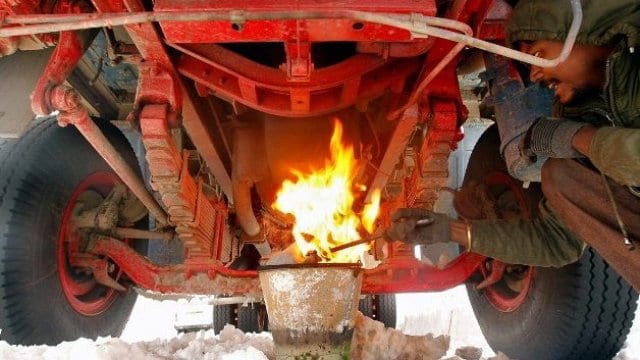
Нужно ли зимой прогревать мотор?
Содержание
Тема о необходимости прогревать двигатель зимой вечна. Мнений по этому вопросу, вероятно, больше, чем звезд на небе. Правда в том, что для людей, далеких от разработки и совершенствования автомобильных двигателей эта тема еще долгое время будет открытой.
Но что думает человек, который создает и оптимизирует гоночные двигатели в американской компании ECR Engines? Его зовут доктор Энди Рэндольф, и он разрабатывает болиды для серии NASCAR.
Два фактора, от которых страдает холодный мотор
Инженер отмечает, что холодный двигатель страдает от двух факторов.

Фактор первый
При очень низких температурах вязкость моторного масла увеличивается. Производители смазочных материалов частично решают эту проблему. Они, грубо говоря, смешивают компоненты с различными характеристиками вязкости: один с низким коэффициентом вязкости, а другой с высоким.
Таким способом получается масло, которое не теряет своих свойств при низких или высоких температурах. Правда, это не значит, что вязкость масла сохраняется с понижением температуры.

В холодную погоду масло в системе смазки густеет, и его движение в масляных магистралях становится более затрудненным. Особенно это опасно, если у двигателя большой пробег. Это приводит к недостаточной смазке некоторых движущихся частей, пока блок двигателя и само масло не станут горячими.
Кроме того, масляный насос может даже перейти в кавитационный режим, когда он начинает всасывать воздух (это происходит, когда скорость всасывания масла из насоса становится выше, чем производительность всасывающего трубопровода).
Фактор второй
Вторая проблема, по словам доктора Рэндольфа, – это алюминий, из которого сделаны большинство современных двигателей. Коэффициент теплового расширения алюминия значительно выше, чем у чугуна. Это означает, что при нагреве и охлаждении алюминий расширяется и сжимается гораздо сильнее, чем чугун.

Основная проблема в этом случае заключается в том, что блок двигателя выполнен из алюминия, а коленчатый вал – из стали. Бывает, что в холодную погоду блок сжимается гораздо больше, чем коленчатый вал, а подшипник вала сидит плотнее, чем необходимо.
Грубо говоря, «сжатие» всего двигателя и уменьшение зазоров приводит к увеличению трения между движущимися частями агрегата. Ситуация усугубляется вязким маслом, которое не может обеспечить адекватную смазку.
Рекомендации по прогреву мотора
Доктор Рэндольф определенно советует прогреть двигатель за несколько минут до езды. Но это всего лишь теория. Насколько сильно изнашивается двигатель, если среднестатистический водитель начинает движение каждый день зимой, как только он его запускает? Это индивидуально для каждого мотора, а также для стиля вождения, который использует автовладелец.

Что можно сказать о мнении уважаемых экспертов о вреде прогрева?
Никто не будет спорить, что даже среди профессионалов есть те, кто уверен, что длительный прогрев мотора может ему повредить.
Фактически нет необходимости простаивать в течение 10-15 минут. Маслу требуется максимум 3-5 минут для достижения диапазона рабочих температур (в зависимости от марки смазочного материала). Если на улице минус 20 градусов, вам придется подождать около 5 минут — вот как долго масло должно нагреваться до +20 градусов, чего достаточно для качественной смазки двигателя.